Globalisation and Development Cooperation

State of the Art About COVID-19’s Impact on Santiago University, Cape Verde
Abstract:
The COVID-19 pandemic has become a critical challenge for the higher education sector worldwide. Under such a circumstance, the exploration of the capacity of this sector to adapt to such a state of uncertainty has become of huge importance. In this chapter, State of the art about COVID-19 impact in Santiago University – Cape Verde, the authors critically reflect on the Cape Verdean teaching experience during the early COVID-19 lockdown. This is an exploratory case study based on a qualitative approach with an aim to reflect on new practices of teaching under a pandemic emergency. Based on the teaching experience of teaching in Santiago University, they explain how this university has changed from a face-to-face to an online teaching system and stress the challenges and opportunities that appear from this transition process. This chapter concludes that this strategy has become an opportunity to the university since it consistently raised the number of international students cooperating with them and also that the more adaptive and resilient approaches to online teaching were also a success.
Quotation:
Sarmento, E., Monteiro, J. (2021). Capítulo 16: State of the art about COVID-19 impact in Santiago University – Cape Verde. In Loureiro, Sandra & Guerreiro, João (eds.) Handbook of Research on Developing a Post-Pandemic Paradigm for Virtual Technologies in Higher Education. ISBN13: 9781799869634; ISBN10: 1799869636. IGI Global (Q2, SJR:0,338)
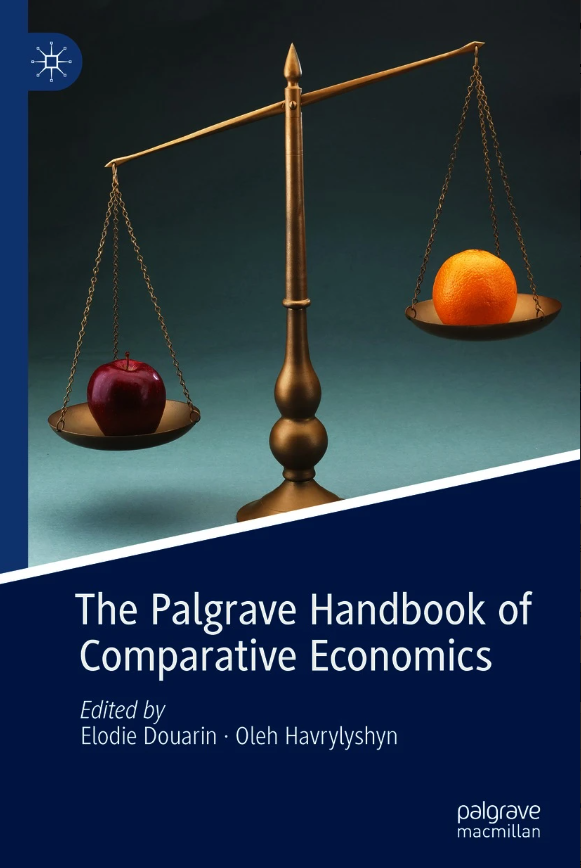
Reform Design Matters: The Role of Structural Policy Complementarities
Abstract:
In this chapter, Reform Design Matters: The Role of Structural Policy Complementarities, we discuss possible interactions across structural policy domains. While relatively more studied in the context of the post-communist transition literature, our survey suggests that relationships of this type hold more generally and can be important to improve our understanding of the relationship between structural reforms and long-run economic growth. Given its potential relevance for the design of successful reform packages, exploring in a more exhaustive way the notion that the effect of a given reform on economic growth depends on the progress made in other policy areas should be a priority point for future research. This may be particularly relevant to help unlock the growth potential of many developing and emerging countries, namely concerning their integration in the global economy. The authors would like to thank Elodie Douarin and Oleh Havrylyshyn for very useful comments on the first draft of this paper. The views expressed in this paper are those of the authors and do not necessarily reflect those of the OECD and its Member countries. Rocha acknowledges financial support from Fundação para a Ciência e Tecnologia (Portugal) through research grant UIDB/05069/2020.
Citação:
Oliveira-Martins, J., da Rocha, B.T. (2021). Reform Design Matters: The Role of Structural Policy Complementarities. In: Douarin, E., Havrylyshyn, O. (eds) The Palgrave Handbook of Comparative Economics. Palgrave Macmillan, Cham. https://doi.org/10.1007/978-3-030-50888-3_19

Ready or not? The ultimate push of Timor-Leste to join ASEAN
Abstract:
A persistent concern raised by member states of the Association of South East Asian Nations (ASEAN) is that Timor-Leste’s readiness for membership is not enough, as Dili, the smallest economy in Southeast Asia, may not be able to sign and implement key commitments, nor to participate in all ASEAN institutions and work programmes. Since its formal request for membership in 2011, Timor-Leste has recently stepped up its efforts for ASEAN membership, with the initial technical support of the Japan International Cooperation Agency and, particularly, the enhanced support of the Asian Development Bank. In 2019, there has been a step change in momentum towards accession, with clear ASEAN statements signalling progress in this regard. The first ever ASEAN fact-finding mission to Timor-Leste to assess the country’s potential for membership concluded successfully in September 2019. Two more fact-finding missions are planned for 2020. We assess in this paper Timor-Leste’s readiness for membership in the three pillars of the ASEAN community: economic, socio-cultural, and political security. In Ready or not? The ultimate push of Timor-Leste to join ASEAN, we assess how recent developments address the concerns historically raised by some ASEAN member states about Timor-Leste’s membership. We conclude that the Cambodian and, particularly, the Indonesian presidencies of the ASEAN in 2022 and 2023 could be an important landmark for Timor-Leste’s accession to the Association.
Quotation:
Martínez-Galán, E. (2021). ‘Ready or not? The ultimate push of Timor-Leste to join ASEAN’. Chapter 4B, pp. 405-435 in Leandro, F.J.B.S., dos Santos, P.P. and Li, Y. (eds) China and Portuguese-speaking Small Island States: From sporadic bilateral exchanges to a comprehensive multilateral platform. City University of Macau. Macao. China. ISBN 978-99981-956-3-9
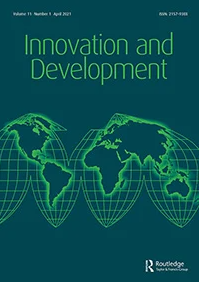
Innovation in development cooperation: emerging trajectories and implications for inclusive sustainable development in the 21st century
Abstract:
In the past twenty years, innovation has slowly, but steadily, become an important presence in development cooperation discourse and practice. The ambitious UN 2030 Sustainable Development Agenda has accelerated this trend, providing a strong framework for the main argument in favour of an innovation agenda for international development: without new ideas and innovative solutions, solving the current global development challenges will not be possible. Although this innovation-push is in line with a wider predominant view of innovation as an inherently positive force of progress, that alone does not explain when, how, and why innovation becomes a key topic in the field. This article seeks to fill this gap in the literature, providing an initial overview of innovation in development cooperation in the post-2000s. It argues, firstly, that innovation has always been part of international development policy and practice. Secondly, it links the recent strengthening of the innovation discourse to three trends in the systemic transformation of the field: the triumph of metrics-based agendas, the ICTs and digitalization revolutions, and the role of private sector actors. It concludes by critically assessing the implications of this narrative in changing the politics of innovation towards more inclusive sustainable development policies and practices.
Quotation:
Ana Luísa Silva (2021) Innovation in development cooperation: emerging trajectories and implications for inclusive sustainable development in the 21st century, Innovation and Development, 11:1, 151-171, DOI: 10.1080/2157930X.2020.1807100
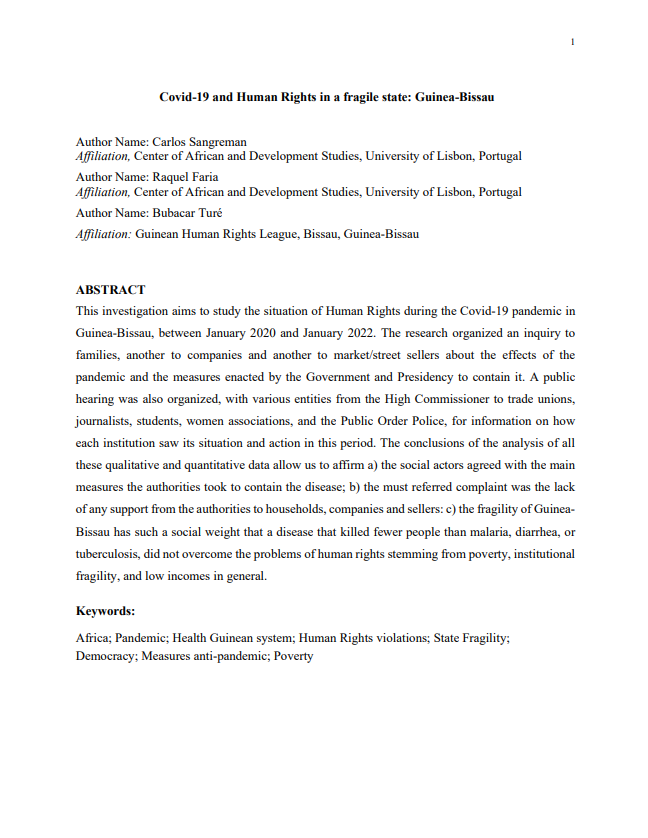
COVID-19 and Human Rights in a Fragile State: Guinea-Bissau
Abstract:
COVID-19 and Human Rights in a Fragile State: Guinea-Bissau aims to study the situation of Human Rights during the Covid-19 pandemic in Guinea-Bissau, between January 2020 and January 2022. The research organized an inquiry to families, another to companies and another to market/street sellers about the effects of the pandemic and the measures enacted by the Government and Presidency to contain it. A public hearing was also organized, with various entities from the High Commissioner to trade unions, journalists, students, women associations, and the Public Order Police, for information on how each institution saw its situation and action in this period. The conclusions of the analysis of all these qualitative and quantitative data allow us to affirm a) the social actors agreed with the main measures the authorities took to contain the disease; b) the must referred complaint was the lack of any support from the authorities to households, companies and sellers: c) the fragility of Guinea-Bissau has such a social weight that a disease that killed fewer people than malaria, diarrhea, or tuberculosis, did not overcome the problems of human rights stemming from poverty, institutional fragility, and low incomes in general.
Quotation:
Sangreman, C., Faria, R. T., & Turé, B. (2022). COVID-19 and Human Rights in a Fragile State: Guinea-Bissau. In P. Andrade, & M. Martins (Ed.), Handbook of Research on Urban Tourism, Viral Society, and the Impact of the COVID-19 Pandemic (pp. 341-360). IGI Global. https://doi.org/10.4018/978-1-6684-3369-0.ch018
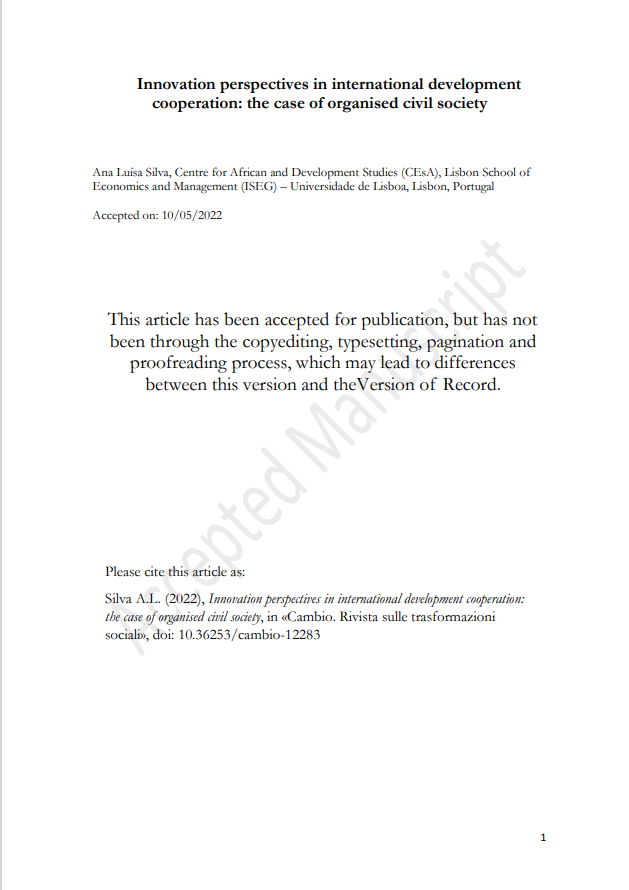
Innovation Perspectives in International Development Cooperation: The case of organised civil society
Abstract:
Non-governmental organisations (NGOs) are still in the side-lines of the emerging literature on innovation in international development cooperation, although the topic has been gaining prominence since the 2000s, accompanying the wider transformation of the development cooperation field. Innovation perspectives in international development cooperation: the case of organised civil society presents the results of a mixed methods research that involved a broad geographic sample of 20 NGO national co-ordinating bodies through an online survey and semi-structured interviews. The goal was to map and analyse innovation perspectives, motivations, and practices in these organisations, understand their relationship with mainstream views of innovation in the field and uncover their potential to promote inclusive innovation. Results suggest that these actors have potential to promote inclusive innovation practices in the field, since they approach innovation with social change as an end goal, as opposed to having an overly solutionist and problem-solving view of social innovation. The paper also highlights the key role of information and communications technologies, as well as digital tools, as both a reason to innovate and enablers of innovation in these organisations. Finally, the conclusion leaves questions open for further research on innovation in development NGOs.
Quotation:
Silva, A. L. (2022). Innovation perspectives in international development cooperation: the case of organised civil society. Cambio. Rivista Sulle Trasformazioni Sociali. https://doi.org/10.36253/cambio-12283
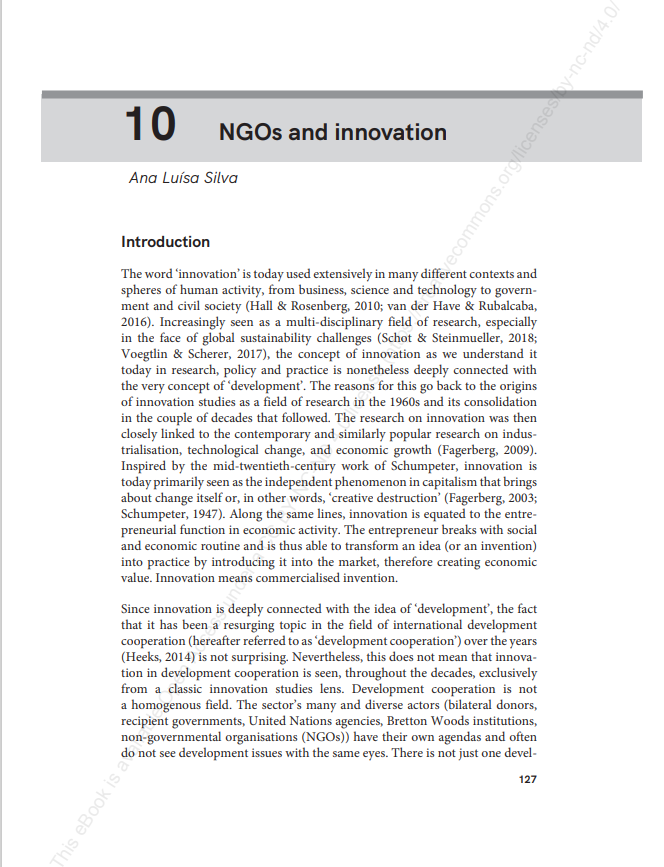
NGOs and Innovation
Abstract:
Over the past twenty years, and against the backdrop of a profound transformation in the international development cooperation sector, innovation has resurged as a ‘hot’ topic in the field. In the same period, development non-governmental organisations (NGOs) face growing challenges of legitimacy, accountability, and dependence on government funding. Their role as precursors of alternative development models, natural social innovators, and catalysts of international solidarity movements is increasingly being questioned. These challenges have been further exacerbated by the Covid-19 pandemic. Existing research on development NGO innovation focuses, like most classic innovation research in other fields, on studying specific, usually successful, innovations; leaving many questions unanswered on topics like innovation failure, processes, culture, funding, motivations, as well as the role of NGOs in innovation for development. This chapter, NGOs and Innovation, by Ana Luísa Silva, gives an overview of the state of the art on development NGOs and innovation, identifying areas that are open for further research. This article is inserted in A Research Agenda for Civil Society, a book by Kees Biekart and Alan Fowler.
Quotation:
Silva, A. L. (2022). NGOs and Innovation. In K. Biekart & A. Fowler (Ed.), A Research Agenda for Civil Society (pp. 127-142). Elgar Research Agendas. Edward Elgar. ISBN: 978 1 80037 814 8
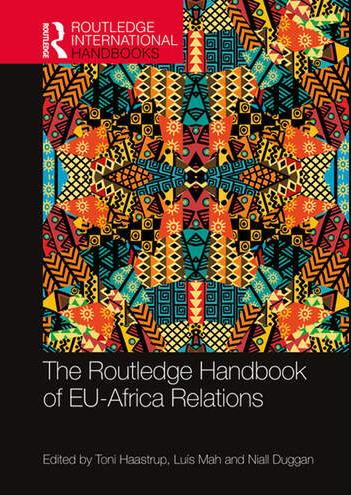
The Routledge Handbook of EU-Africa Relations
Abstract:
This handbook provides a comprehensive overview of the changing dynamics in the relationship between the African continent and the EU, provided by leading experts in the field. Structured into five parts, the book provides an incisive look at the past, present and potential futures of EU-Africa relations. The cutting-edge chapters cover themes like multilateralism, development assistance, institutions, gender equality and science and technology, among others. Thoroughly researched, this book provides original reflections from a diversity of conceptual and theoretical perspectives, from experts in Africa, Europe and beyond. The handbook thus offers rich and comprehensive analyses of contemporary global politics as manifested in Africa and Europe. This handbook will be an essential reference for scholars, students, researchers, policy makers and practitioners interested and working in a range of fields within the (sub)disciplines of African and EU studies, European politics and international studies. The Routledge Handbook of EU-Africa Relations, by Luís Mah (researcher for the Centre for African and Development Studies), Nial Duggan and Toni Haastrup is part of the mini-series Europe in the World Handbooks examining EU-regional relations and established by Professor Wei Shen.
Quotation:
Mah, Luís, Duggan, Nial & Haastrup, Toni (2021). The Routledge Handbook of EU-Africa Relations. Routledge. ISBN 9781315170916.
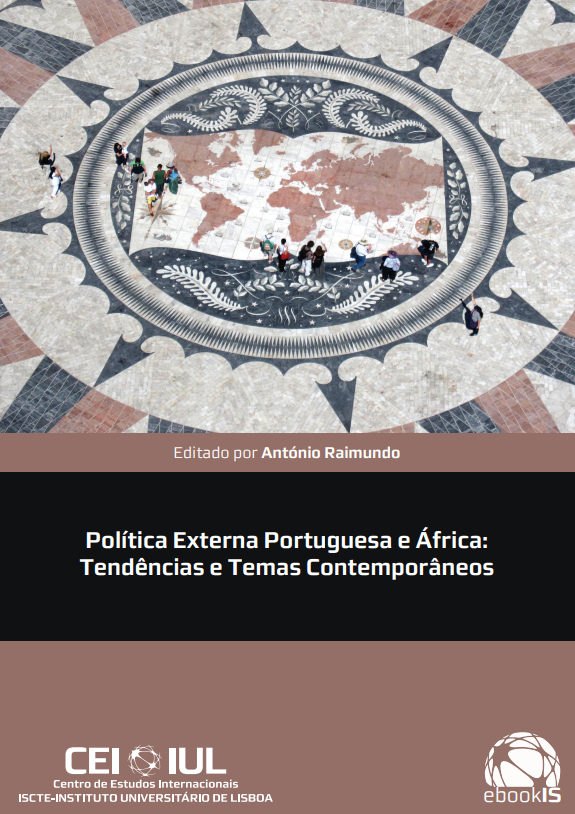
Portugal e o Bazar Africano: Mapeando trocas comerciais, fluxos de investimento e de ajuda ao desenvolvimento
Abstract:
Authored by Luís Mah, Portugal e o bazar africano: Mapeando trocas comerciais, fluxos de investimento e de ajuda ao desenvolvimento (with Rodrigo Ferreira do Amaral and Tcherno Baldé) is the fifth chapter of the e-book “Política Externa Portuguesa e África: Contextos e Tendências Contemporâneo” by A, Raimundo. In recent decades, Africa has gone from a ‘hopeless’ continent to an attractive and potential frontier market. The rapid economic changes in the region have benefited from new patterns of global engagement, involving emerging economies such as China or India. These developments have promoted increasing South-South cooperation, with several African countries seeking greater integration into the world economy. This chapter begins by analysing the current African economic context. Next, it explores how Portugal has developed its economic presence and cooperation on the continent since the mid-1970s, considering three indicators: trade, investment and development aid. Finally, the article assesses the challenges and opportunities for Portugal’s economic relations with Sub-Saharan Africa.
Quotation:
Mah, Luís (2019). Portugal e o bazar africano: Mapeando trocas comerciais, fluxos de investimento e de ajuda ao desenvolvimento (com Rodrigo Ferreira do Amaral e Tcherno Baldé) Em Política Externa Portuguesa e África: Contextos e Tendências Contemporâneo editado por António Raimundo, Lisboa: Centro de Estudos Internacionais, ISCTE-Instituto Universitário de Lisboa. ISBN 978-989-781-168-5. Cap. 5. pp. 121-139.
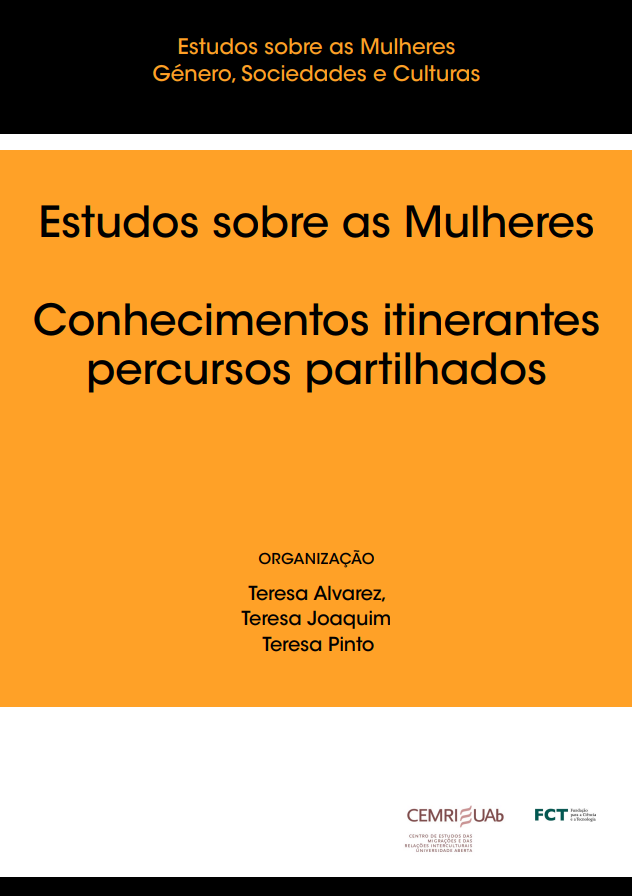
Contributo para uma leitura sobre práticas de cooperação para o desenvolvimento. O Projeto PAIPA implementado na Guiné-Bissau.
Abstract:
Contributo para uma leitura sobre práticas de cooperação para o desenvolvimento. O Projeto PAIPA implementado na Guiné-Bissau refers to an evaluation work of the Project to Support the Intensification of Food Production (PAIPA), a development cooperation project in the field of agriculture, included under the scope of Portuguese cooperation with Guinea-Bissau. The main objective was to construct an Evaluation focused on the intervention methodology designed for the implementation of the project, analysing the pathways, actions and resources mobilized to achieve the central objective of promoting the transition from traditional family-based agriculture in Guinea-Bissau to cash crop agriculture. The project documentation was analysed, interviews were conducted in Portugal and Guinea-Bissau with technicians and cooperation agents, local informants and PAIPA beneficiaries in the regions where the intervention took place. PAIPA was considered a successful project because it is based on respect for local specificities and is committed to the involvement of the target populations.
Quotation:
Frias, Sónia, (2019), “Contributo para uma leitura sobre práticas de cooperação para o desenvolvimento. O Projeto PAIPA implementado na Guiné-Bissau” in Alvarez, Teresa, Teresa Joaquim e Teresa Pinto (org.) Estudos sobre as Mulheres – conhecimentos itinerantes, percursos partilhados, Estudos sobre as Mulheres 1. Lisboa. CEMRI/UAberta. ISBN 978-972-674-863-2.





